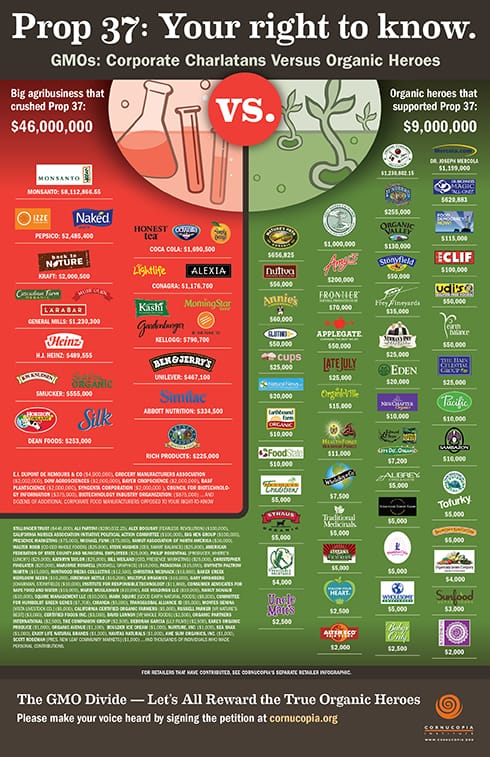An Indiana farmer who was successfully sued by Monsanto for unauthorized use of its genetically modified (GMO) soybean seeds will have his appeal heard by the US Supreme Court.
To be clear, the spirit of this case (Bowman v. Monsanto, 11-796) is very different from the class-action lawsuit brought by a group of organics farmers who have been targeted by the company over the years for unauthorized use of seeds blown onto their properties.
This situation involves a farmer who knowingly uses GMO seeds for cultivation and it could set an important legal precedent for GMO patents.
Monsanto’s aggressive protection of its patents is infamous, and it a grave concern for organic and non-GMO agricultural producers. Since the mid-1990s, 144 famers have been sued for alleged violations of its patented seed technology. Some operations have switched crops rather than risk standing up to the well-funded, litigious biotech bully.
The legal question in the case to be heard by the Supreme Court centers on a clause in Monsanto’s license agreements that prohibits farmers that use its patented seeds – which are resistant to its Roundup herbicide – from collecting second generation seeds from the harvest and using them in future crops.
Monsanto does this because the Roundup resistance is replicated in each generation of seeds – if farmers can use the second-generation seeds it will lose a huge source of revenue.
The case before the Supreme Court is filled with gray areas. The farmer in question, Vernon Bowman, licensed and used Monsanto’s GMO soybean seeds for his first crop of the season. For the late-season crop, he bought and planted commodity soybean seeds from a grain elevator.
The snag is that some of those seeds were found to contain Monsanto’s technology, so the company did what it often does in such situations – it sued.
Monsanto successfully argued in a lower court that this practice amounted to patent infringement, violating its prohibition against saving seeds.
But in his petition to the Supreme Court, Bowman challenges the earlier rulings – saying Monsanto is taking its protection of its patents too far because the seeds he was using in his late-season crops were acquired elsewhere.
Support for GMO Labeling Runs High in California
The case comes at a crucial juncture for the GMO industry. This November, California voters will vote on Prop 37, the California Right to Know Genetically Engineered Food Act. If approved, all foods containing GMOs will have to labeled. Many believe other states will follow.
So far, corporate opponents to mandatory labeling, led by Monsanto, Dupont and the Grocery Manufacturer’s Association, have spent $35 million to defeat it, compared with slightly more than $4 million spent by advocates.
Some of the companies fighting labeling own well-known organic or "natural" brands: Kashi (Kellogg), Cascadian Farm, JM Smucker, and Horizon Organic & Silk soy milk (Dean Foods).
Organic meat company Applegate is the latest to step forward on the "Yes" campaign, with a donation of $50,000, reports The Cornucopia Institute. Stonyfield Chairman Gary Hirshberg has donated, but many notable companies including Whole Foods, Trader Joe’s, Hain Celestial, Newman’s Own and Driscolls have yet to step up.
After being the focus of Cornucopia’s "Missing in Action" infographic, Whole Foods came out publicly with support, but hasn’t backed their position with a contribution.
"Some of these companies are the largest and most profitable in the organic industry," says Mark Kastel, senior farm policy analyst for Cornucopia. "We continue to believe they should reevaluate their hesitancy to financially back an issue that is near and dear to the vast majority of their most dedicated customers."
Despite the flood of money spent to try to crush GMO labeling, 60-70% of California voters support the initiative, says Cornucopia.


Monsanto is a corporate bully that cares only about their own profits and stomps on the small honest humble farmer. What a shame this is allowed in our society.
All these companies in business with gmo, can pick the gmo corn out of my Schmitt and eat it.